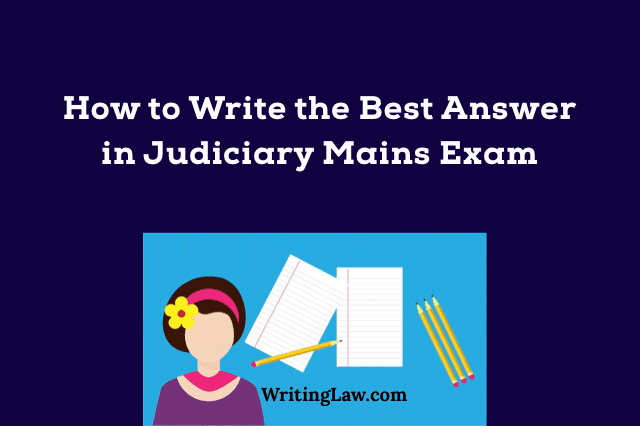
State Judicial Examination, popularly known as PCS(J), or Judiciary Exam, consists of three stages. They are Preliminary, Mains, and Interview. One needs to clear all these stages to become a judicial officer.
Preliminary is the qualifying stage. After that, based on the assessment in the Mains exam, students are selected for the interview. In most cases, it is the Mains exam that decides whether a student is capable of making it through or not.
There are several tips and techniques to write the perfect answer in the Judiciary Mains exam. An on-point answer makes our paper stand out and impressive. Let us look at twelve effective ways to write the best possible answer in the Mains exams for the year 2025 and beyond.
Tips to Write the Best Answer in the Judiciary Mains Exam
While writing the Mains paper, many things need to be kept in mind. The race is not easy, but not very difficult either. A systematic approach can make it work.
Important points to write the best answer while sitting in the hall for the Mains exam are as follows.
1. Make Sure You Understand the Question.
The first thing that we see in the paper is the arrangement of questions as per the allocation of marks. Before flipping on any other item, you must understand what the question is asking.
For example, If the question is why the evidence of an accomplice is not trustworthy? Then, you cannot write what evidence is and who is an accomplice. This will lengthen your answer, and you won’t be able to write the main content asked in the question.
Sure, if it is a detailed, long answer question, then go for it. But if the question carries fewer marks, stick to the point. Do not write stories. This is not your college or university exam. Here, the more precise and on-point you are, the better are the chances for scoring well.
2. Stick to the Word Limit.
The word limit is mentioned for every question or set of questions. It is there for a reason. So, keep the answer within the word limit. Examiners value and appreciate the answers written within the prescribed limit.
The team that sets these high-level papers roughly knows in how many words the answer to a particular problem can be described masterfully. So, value the limit set by them. If you exceed the word limit, it may backfire.
What is the use of holding your nose by bending your hand around your neck when you could have simply held it from the front?
3. Keep Your Answers Simple.
Try to write your answer in the most straightforward form. Your motto should be to convey your ideas in a way that a wide range of people can understand. Inserting big and tough words does not necessarily make your answer attractive.
However, in the Judiciary Exam, do not restrict yourself from using legal maxims and phrases to support your answer. These words make the writing presentation quite impressive.
4. Write Short Sentences.
In the Judiciary exam, your primary motive should be to make yourself heard. The best way to clearly express yourself is to write short sentences. They are easy to read, understand, and convey the impression of friendliness. You may also choose to write in points. Like (1), (2), (3), and so on.
When you prepare for PCSJ exams, practice writing small sentences in your notebook. If you write a lengthy sentence, practice the art of breaking it into two or three separate smaller pieces. This will gradually become your habit.
Note: When you are writing the exact law, then do not break it. In that case, you have to write the long sentence or, however, the section name is (which may be devoid of regular grammar and norms. Law sentences are quite lengthy.)

5. Break the Answer into Paragraphs.
A long paragraph is arduous to read. Short paragraphs, on the other hand, are easy to consume. Also, dividing your long answer makes the presentation better.
Now, you may ask, what is the ideal paragraph size? Well, it varies. However, the acceptable limit ranges from three to five sentences. These small chunks of precise writing in short sentences are valuable for all written exams or projects you undertake in the future.
6. Make Ample Use of Legal Terms.
While writing, try to make the answers precise by using legal terms and words. For example, Suppose you are trying to say that the marriage is void and parties have no legal obligations attached to it. This sentence is perfect, and it makes sense, as well. But since you are writing a law exam, try to use legal terms.
Here, you can simply write that the marriage is annulled. It sounds short and on point and exhibits that you have read multiple law content. The examiner will be impressed.
7. Mention Important Case Laws.
Adding case laws to the answer makes it more authentic and convincing. The latest case laws work as a punch mark to the written law that you write in the answer.
Even if you don’t remember the name or citation of a case, you can only write the verdict. The examiner is not very interested in knowing the name or story behind a case. Instead, he wants you to mention the verdict or the judgment delivered by the apex court. Make sure you write this appropriately and suitably.
8. Follow Proper Judgement Writing Format.
When you are attempting to write a judgement in your answer, remember the format or the sequence. It is simple, and you can find these in various law books. The main thing in writing judgement is inferencing the correct law and its application to the given facts.
9. Avoid Using Many Abbreviations.
You are sitting in the hall, hoping to become a member of the judicial services. Show this in the paper as well. Filling your subjective answers with abbreviations makes it less formal.
You are not using a small smartphone display or exchanging fun conversations with your mates. Rigorous hard work of multiple years should reflect in your words. Do not ruin it with a quick abbreviation.
When a person reads a paragraph, he wishes to continue a flow while reading all the sentences. A short form or punctured word breaks this flow. Make the paper checker comfortable with your answers. Always remember you are an upcoming judge. Your words should reflect your mindset and philosophy.
10. Have a Synopsis in Mind.
Before putting the pen on the sheet, make sure to have an outline in mind. Ensure that you have a clear picture of the layout of your answer. Do not think that ‘I will improvise as I proceed.‘ Have a clear picture from the beginning. It prevents mistakes and makes your answer more systematic and chronological.

11. Set an Estimated Time Limit for a Question.
You know your writing speed and the duration in which you can put thought from mind to paper. So, how much time to give to a question or set of questions (short or long) entirely depends on you.
When writing an answer, try to complete it within your set time frame. If you stretch one or two questions and exceed the time limit, you will unnecessarily start to panic and lose control. So avoid that. The above tips, like sticking to the word count and having a summary before writing, will significantly help in adhering to the time limit.
Always remember that one or two questions with good, long answers are not an excuse to miss even a single question!
For example, Suppose there are two long answers, and 40 minutes remain. You utilise 32 minutes to write an excellent answer to one question and have only 8 minutes for the second one. Don’t do that.
In 20 minutes, you can write an answer that will award you 7 out of 10 marks. If you utilise 32 minutes, most likely, you will get 8.5 out of 10 for that.
Just think that, for 1.5 additional marks, is it okay to sacrifice the other question where you could have easily scored a minimum of 5 or 6 marks had you given it the appropriate share of the remaining time?
12. Allot the Last 15 Minutes for Revision.
This is a very crucial time. Within fifteen minutes, you have to go through the whole paper, which took you multiple hours to write! But it is essential.
In these fifteen minutes, check if you have missed a word, an essential note, punctuation, a short example, or a case name. You may also use this time to underline the crucial points of an answer. This time is also suitable to check your credentials once more and ensure that everything is correct.

Success in Judiciary Mains Exam!
Keeping these techniques in mind, you can attempt the Mains examination efficiently and flawlessly. A systematic approach can make any horse win the race. Pick your weak points and work on them. Appropriately utilise the time now. Back it up with a proper routine and proper management. Once you discipline yourself, no goal is too big.
Finally, a law student preparing for the Judicial Services Exam comes across multiple opinions on how to study law and other instructions. Make it a point never to get carried away with every advice you get. Listen to every piece of information, but before acclimatising it, analyse it yourself. A person better knows about themself than any other. All the best.
- Section 230 BNS (Bharatiya Nyaya Sanhita) - 12th October 2025
- Section 231 BNS (Bharatiya Nyaya Sanhita) - 12th October 2025
- Section 232 BNS (Bharatiya Nyaya Sanhita) - 12th October 2025









Thank you for your valuable guidelines for the JCJ mains exam and these are very useful to us for succeeding in the exam sir.
Happy to read your kind words.